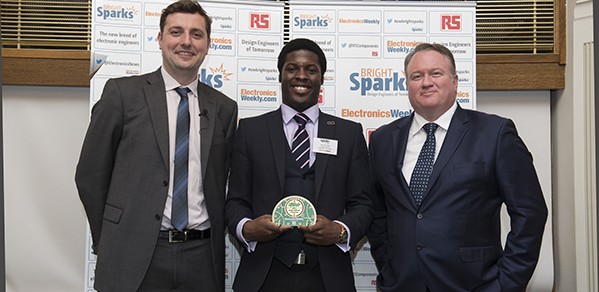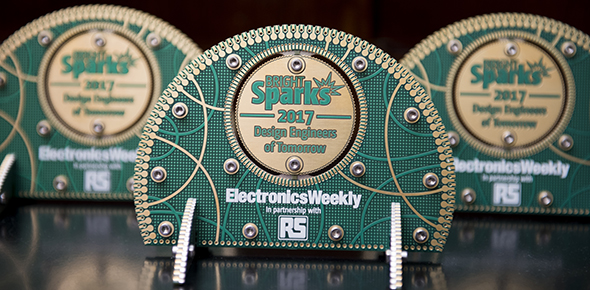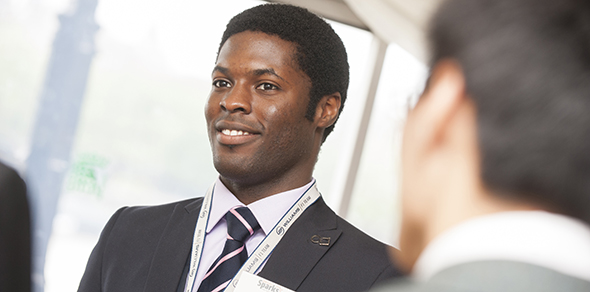
Cambridge Engineering alumnus Keno Mario-Ghae has been announced as a 2017 award winner of the BrightSparks Design Engineers of Tomorrow.
The University of Cambridge is the only place I know that as a 20-year-old student you can go off and build a solar powered car that costs half a million pounds and race it across the continent of Australia! You can have an idea and get your friends together to make it happen really quickly. Cambridge is amazing.
Engineering alumnus Keno Mario-Ghae.
RS Components partnered with Electronics Weekly on its inaugural EW BrightSparks programme to celebrate the achievements of the UK’s most talented young electronics design engineers and help to inspire and encourage new entrants to the industry.
Keno Mario-Ghae was described in his EW BrightSparks nomination as ‘an exceptional professional’. Since graduating from the University of Cambridge with a degree in Engineering and a Master’s degree in Manufacturing and Management, he has taken nothing for granted. Through hard work and perseverance, Keno has achieved a huge amount already in his career, including working as an Ambassador for the World Solar Challenge since 2013, and complex product design on the Creator Ci20 board.
In addition, he’s helped develop exceptional products at Imagination Technologies. In the process, he was awarded the NMI 2016 'Young Engineer of the Year' award.
Keno is a project engineer at Imagination Technologies, a leading manufacturer of semiconductors.
“We design the internals in chips, for example in smartphones such as the iPhone or in wireless routers, and our partners go on to design them into chips," he said. "You don’t see them but they’re in lots of the products that we use every day.”
Lindsley Ruth, CEO, Electrocomponents, and one of the EW BrightSparks judges, said: "Keno stands out as an EW BrightSparks winner for his incredible personal drive and ambition. He pushes the boundaries in all aspects of his life, from his own personal sporting achievements through to his passion for supporting the development of sustainable energy and his product development work for Imagination Technologies, where he has won awards for his work on scalable Internet of Things technology and growing the wider MIPS ecosystem."

Renaissance man
Keno originally wanted to be a pilot or astronaut and cites his two engineering career influencers as “a really inspirational teacher who opened my eyes to engineering”, taking students on factory tours and really encouraging them to see engineering in action; and “John McArther, a really eccentric guy who sold me on the idea of the ‘Renaissance man’ – that you can be an athlete, scholar and gentleman, and you should go to Cambridge and just try!”
Keno describes his time at University of Cambridge as “magical with so much history, as well as being at the cutting edge of development”.
He continued: “It’s the only place I know that as a 20-year-old student you can go off and build a solar powered car that costs half a million pounds and race it across the continent of Australia! You can have an idea and get your friends together to make it happen really quickly. Cambridge is amazing but it’s very difficult academically, really tough”.
The realisation that he really wanted to go into engineering came about following a lesson covering momentum and Newton’s Laws of Motion: “…so if a rocket throws mass out the back, the mass throws the rocket and it goes off. It all looked so simple and I and my friends thought ‘do we even trust these calculations?’ So we built our own rocket, we launched it and it worked perfectly. The rocket went up to 700ft, came down on a parachute and it worked exactly as per our calculations, which was really fantastic. I had the exciting realisation that I can have an idea and actually make it happen,” he said.
World Solar Challenge
We asked Keno about the work he’s done on solar power: “The fundamental thing is that the natural resources we have on the earth are limited, so we have to do something about it.”
The World Solar Challenge is a 3,000km solar marathon across the outback of Australia. It gets the greatest minds together to try to solve the problem of mobility because, as we all know only too well, fossil fuels will run out one day. Keno was involved as a team leader while at university and continues his involvement now as an ambassador.
“I get to talk about the global issue we’re facing and what the World Solar Challenge is trying to do. What it actually stands for and what the future might be. The young engineers of today are the ones that will design the future of mobility, so the more of us that are aware of the issues, the more of a difference we can make,” he said.
Supporting young engineers
Keno is passionate about encouraging the next generation and believes there are a number of reasons why more young people are not choosing engineering as a career. Firstly, there is a lack of understanding around what today’s ‘engineers’ really do, with many people thinking of grimy, mechanical workshops rather than cleanroom-style innovative electronic design environments.
Keno points out that despite all the amazing technological advancements we’ve made in some really exciting areas that “often people don’t realise that it is the engineers that make these technologies or build the systems to make these things happen. I believe the more we show young people about what is possible, the more they will come on their own free will.”
He continues: “You never really hear about engineers on TV. If I wanted to be a lawyer, there are plenty of law programmes, same with police dramas, doctors and healthcare professionals, but you don’t really hear about engineers. It’s also partly our fault because engineers don’t talk about what we do. We just don’t say ‘I worked on some really cool stuff today’. In fact, my grandfather was an engineer and I didn’t even know that until after I applied to study engineering! That’s partly my fault for not asking, it’s also partly his fault for not sharing! But it is definitely something that we have to correct in our generation so that we don’t make the same mistakes again.”

Creator Ci40
Keno’s cites the project he has been working on for the last two years as his proudest electronics achievement – building the Creator Ci40 IoT Development Kit. “As a team, we built the Creator Ci40 kit, which is an IoT development kit that helps people to understand the principles of building things at scale and gives them the ability to practically deploy systems within hours rather than months. There were a lot of teething issues – the biggest problem was that generally, user ability was extremely varied, so my greatest achievement was developing a team to build out reference examples and libraries so that users who were not at the peak of software engineering or electronics could still build systems. The kit has taken the average time to build a system from 2 weeks to 2 hours. Next, we’ll go from 2 hours to an hour, and if we keep going maybe we can even get that down to just minutes.”
Peak performance
Keno is a high achiever outside of his day job too and is a keen athlete, particularly enjoying the high jump and hurdles.
“I’ve always loved athletics. I started when I was 12 years old and really athletics is competition in its purest form as it is you against the clock, trying to jump as high as you can or be as fast as you can. I really like that because you are trying to be the best that you can be. When competing against friends it is about them bringing out the best in you, rather than beating them. I think a lot of those attributes are transferable. I find that when I am at my peak athletically, I tend to be at my peak at work – creativity and all the other elements seem to be linked. You have to push yourself to the limit and be the best that you can be.”
This article first appeared on the RS Components website.
Words: Leonie Clayson, RS Components.

